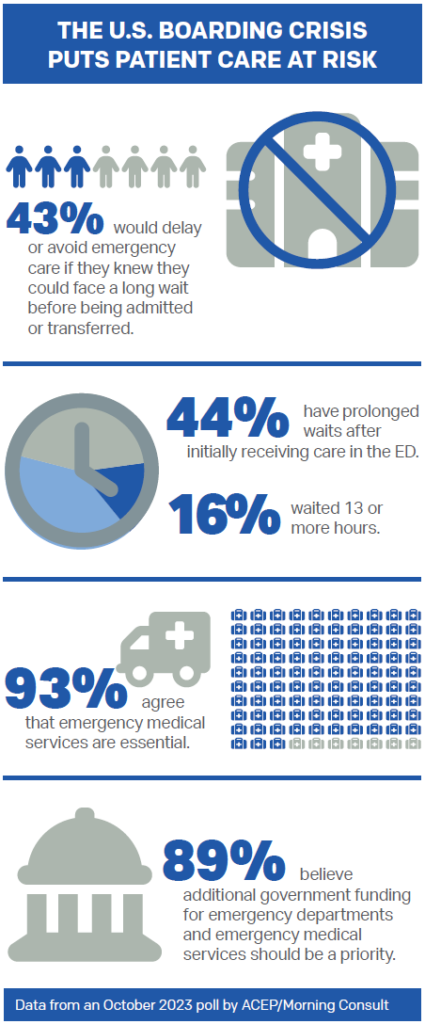Boarding in the emergency department is a systemic crisis with emergency physicians at the center. While the challenges related to boarding have persisted for decades, the dangers today are unprecedented, and solutions are beyond any individual physician or hospital effort.
Explore This Issue
ACEP Now: Vol 42 – No 12 – December 2023ACEP said as much to the White House by writing a powerful letter in November 2022 supported by 34 organizations to show how serious the issue has become. To date, there has been no formal response from the Administration.
Absent federal action, the College took the lead to identify and pursue collaborative solutions.
On Sept. 27, ACEP organized and led the first national stakeholder summit on boarding. Medical societies, state and federal government leaders, hospital and nursing home representatives, and patient advocates assembled in the ACEP DC office for a day-long dialogue on the boarding crisis.
“Boarding is a disaster, but there’s no disaster plan for it,” said David Sklar, MD, FACEP the chair of the ACEP Boarding Task Force. “This can be prevented.”
The summit participants examined the multifactorial causes of boarding through the lens of transparency, regulatory challenges, mental health, financial drivers, operational modifications, workforce, and other categories. A detailed summary of the proceedings is available at acep.org/boarding.
Participants began by going around the room, highlighting current efforts that are working and other measures that fall short, with a focus on local, state and national government actions that could mitigate the crisis.
Summit participants agreed that better data collection could inform and improve processes and decision making in many ways.
Centralized and standardized resource tracking, increased state and local access to preparedness data, and better information sharing across systems regarding capacity, staffed bed availability, and other important measures were prominent among suggestions that could greatly improve efficiencies. The critical importance of interoperability and transparency was noted.
The discussion revealed worrisome gaps in federal efforts to address factors that exacerbate the crisis.
“Most of the causes are outside of the emergency department, we just end up being ground zero,” said Laura Wooster, ACEP Senior Vice President, Advocacy and Practice Affairs.
Special focus was paid to workforce issues, an area in which ACEP has been sounding the alarm for months.
Multiple stakeholders emphasized the importance of sharpening the focus, as well as refining the federal and state review of training programs for nurses and long-term care workers. Support was broadly affirmed for practical measures such as increasing nursing program slots and increasing incentives for workers in rural communities.
With heads nodding in agreement, the stakeholders acknowledged the need for increased investment in public health, more emphasis on evidence-based policy, and a re-alignment of the financial incentives that could better encourage coordination across hospitals and other care settings, from specialty referrals to enhanced mental health care support.
Still, there are concerns that systemic factors degrade the quality of the care that emergency physicians and others know they can deliver.
“This crisis is causing moral injury,” said Christopher Kang, MD, FACEP, Immediate Past President of ACEP. “It hurts me to my core if I can’t do what I’m trained to do, especially in those instances where I might be the only one available to help. We have to do better.”
As recognition of ubiquitous challenges shifted toward the talk of solutions, progress on several fronts was noted.
Multiple initiatives were recognized for their ability to stabilize mental health crises, including EmPATH units and the coordinated crisis response model used by Northwell Health, which involves schools working closely with the hospital to make sure students get the medical attention they need.
At the local level, the participants acknowledged the largely untapped potential for patient advocacy groups to raise awareness and work toward tailored solutions that resonate where they are needed most.
“Boarding is a disease causing widespread dysfunction and we feel it every day. Until we make everyone aware of what’s going on, we are doing a disservice to our patients,” said ACEP President Aisha Terry, MD, MPH, FACEP.
Everyone recognized the detrimental impact of emergency department violence on staffing constraints and burnout, with stakeholders voicing enthusiasm for legislative solutions such as the SAVE Act, which ACEP directly informed and strongly supports.
The Summit is one important piece of ACEP’s comprehensive campaign to address boarding in the emergency department.
Beyond writing to the White House, ACEP gathered more than 140 troubling stories from members on the frontlines and is actively involved in developing federal legislation to close gaps in mental health care, as well as tackle the broader boarding issue more systemically.
There are hopes for another summit in the months ahead as these discussions continue.
ACEP leadership on difficult issues like this is invigorating emergency physicians across the country. As a result, there are new chances to address longstanding issues head-on with emergency physicians driving meaningful change.
Steve Arnoff is a senior communications manager at ACEP.
Pages: 1 2 3 | Multi-Page





No Responses to “ACEP Leads National Summit on the Boarding Crisis”